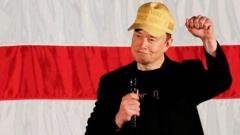Tech billionaire Elon Musk has announced an ambitious plan to distribute $1 million each day to registered voters in crucial swing states leading up to the US presidential election on November 5. The recipients will be randomly selected from individuals who sign a pro-US Constitution petition organized by Musk’s political action committee, AmericaPAC, aimed at aiding Donald Trump’s candidacy. The initial winners were revealed during a town hall event in Pennsylvania, where attendees were taken by surprise.
Democratic Pennsylvania Governor Josh Shapiro raised concerns, labeling Musk's approach as "deeply concerning" and suggesting law enforcement may need to investigate the financial incentives tied to voting. This initiative is open to voters across pivotal states such as Pennsylvania, Georgia, Nevada, Arizona, Michigan, Wisconsin, and North Carolina.
Legal experts, including election law authority Rick Hasen, have criticized Musk's endeavor as "clearly illegal." Federal regulations prohibit anyone from offering payment for registration or voting, potentially leading to severe penalties. Although Musk's campaign claims that sign-ups are voluntary, the targeting of swing state voters raises questions about the underlying motivations behind the payments.
For those in Pennsylvania, signing the petition will yield $100, plus a further $100 for each new person they recruit to participate; different incentives are offered in other contested states. Critics argue that while direct payments for voting are illegal, this method could be exploiting a loophole by incentivizing petition signings, which may heavily skew towards Trump supporters.
Musk's influence in the political arena has grown since he founded AmericaPAC in July, reportedly donating upwards of $75 million to the cause. His initiatives strive to rally support around core conservative values, including border security, public safety, fiscal responsibility, and the protection of constitutional rights.
Musk has expressed ambitions of gathering over a million registered voters to sign the petition, citing the importance of voicing support for the First and Second Amendments. Currently holding the title of the richest individual in the world with a net worth of around $248 billion, Musk's foray into the political landscape highlights the complex intersection of wealth, influence, and democracy in America.





















